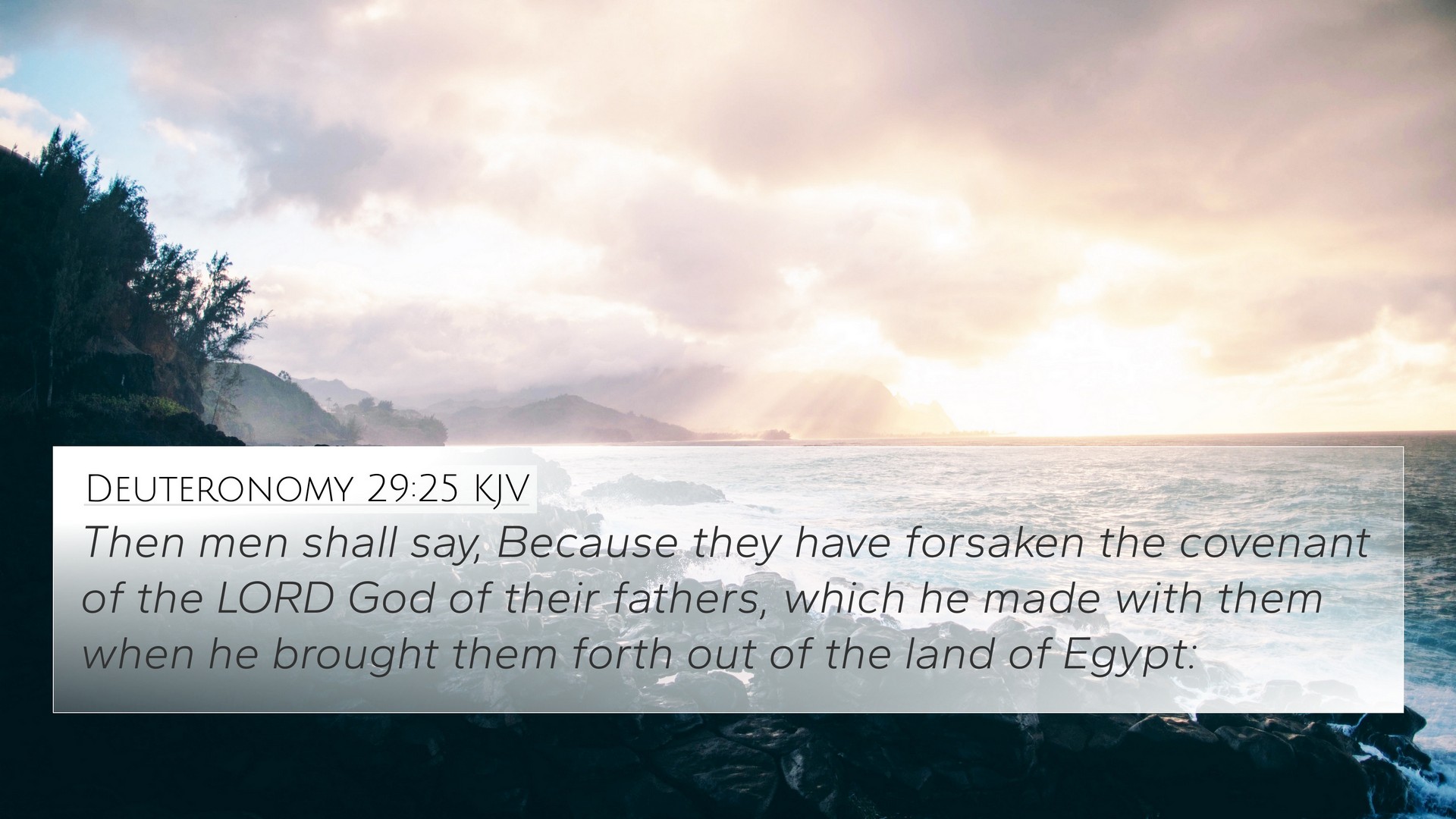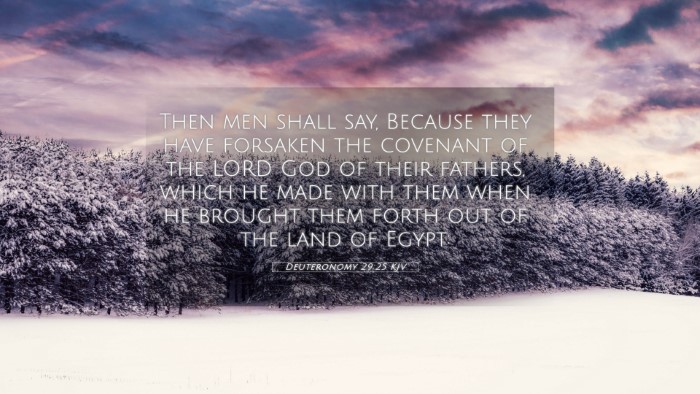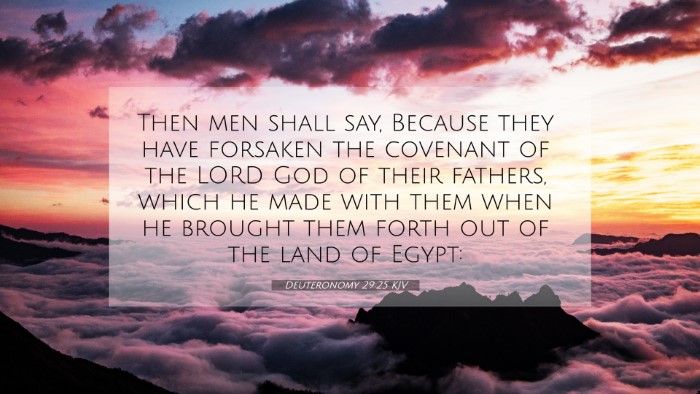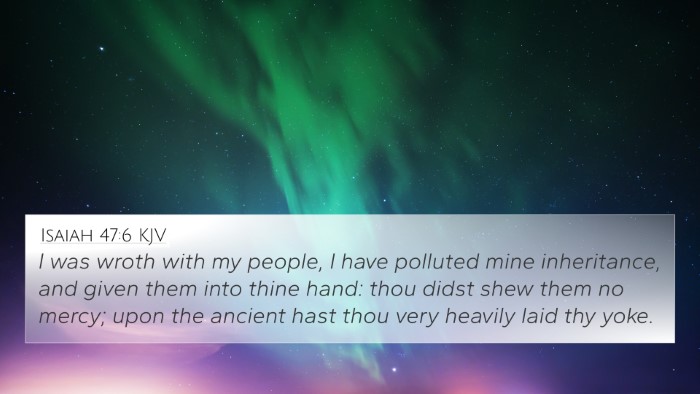Understanding Deuteronomy 29:25
Deuteronomy 29:25 states: "Then men shall say, 'Because they have forsaken the covenant of the Lord God of their fathers, which he made with them when he brought them out of the land of Egypt.'" This verse captures a moment of reflection on the consequences of Israel's disobedience and the covenant relationship between God and His people. Below, we explore various insights and interpretations from notable commentaries.
Significance of the Covenant
Matthew Henry emphasizes the importance of the covenant made between God and Israel. He notes that this covenant was not just a legal agreement but a relational commitment; breaking it resulted in dire consequences not only for individuals but for the entire nation.
The Consequences of Forsaking God
Albert Barnes expands on the consequences mentioned in Deuteronomy 29:25, explaining that turning away from God leads to a loss of blessings and a path towards judgment. The forsaking of the covenant signifies a rejection of divine guidance and protection, leading Israel into spiritual and moral decline. He cites historical events where Israel faced repercussions for their disobedience.
Reflection on Historical Context
Adam Clarke provides a historical context for understanding this verse, linking it to the Israelites' journey from Egypt. He explains that the mention of Egypt serves as a reminder of their deliverance by God and highlights the gravity of abandoning faith after receiving such grace.
Thematic Connections
This verse is often connected to others throughout Scripture, providing a broader understanding of God's covenant and the seriousness of disobedience. Some key cross-references include:
- Exodus 19:5-6: God calls Israel a "kingdom of priests" if they obey His covenant.
- Jeremiah 11:10: Israel’s recurring unfaithfulness to God's covenant is highlighted here.
- Hebrews 10:26-29: The New Testament perspective on willful sin after receiving knowledge of the truth.
- Romans 11:22: A warning to Gentiles about the goodness and severity of God.
- 2 Chronicles 15:2: An emphasis on seeking God for divine favor and peace.
- Hosea 6:7: Israel's betrayal of God as a covenantal partner.
- Galatians 6:7: The principle of sowing and reaping, applicable to covenant faithfulness.
Linking Bible Scriptures
The process of cross-referencing is vital for deeper Bible study. By examining related verses, we can see patterns of behavior and divine response that have theological significance. The connections between these verses emphasize the consistent message of the consequences of forsaking God and the invitation to remain in covenant with Him.
Tools for Bible Cross-Referencing
To facilitate the study of cross-references, readers may utilize resources such as:
- Bible Concordance: A tool for locating verses by keywords.
- Bible Cross-Reference Guide: A compilation of related verses for thematic study.
- Bible Chain References: A method of linking verses related to a central theme.
- Bible Study Software: Applications that provide cross-reference capabilities for deeper analysis.
Inter-Biblical Dialogue
The dialogue between the Old and New Testaments also helps clarify the significance of themes present in Deuteronomy 29:25. In the New Testament, Jesus expands on the idea of covenant through His teachings and fulfillment of law, drawing parallels to the faithfulness required by God’s people.
Conclusion
In summary, Deuteronomy 29:25 serves as a poignant reminder of the consequences of abandoning covenant faithfulness. By utilizing cross-referencing tools and understanding the historical and thematic connections, believers are encouraged to engage more meaningfully with Scripture, thus reinforcing their commitment to God.
Related Keywords:
- Bible verse cross-references
- Connections between Bible verses
- Linking Bible scriptures
- Comparative Bible verse analysis
- Bible verses that relate to each other
- Cross-referencing Biblical texts
- Thematic Bible verse connections
- Bible verse parallels
- Scriptural cross-referencing
- Inter-Biblical dialogue










